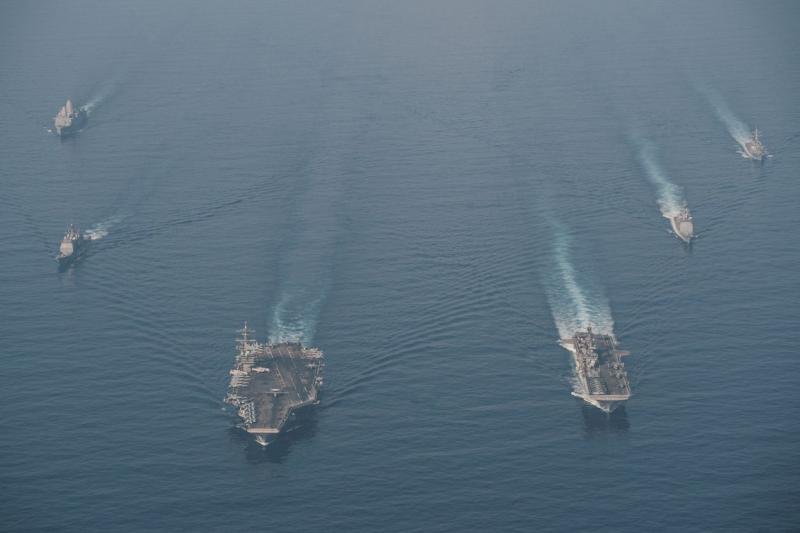'2034' Review: Navigating a Disaster
By: Howard W. French (WSJ)



The year is 2034. Mike Pence has recently concluded a single-term presidency, and his successor is a woman. Not only that, for the first time a new American leader has risen to the office as an independent.
If much has changed in the world, there is plenty of continuity, too, nowhere more so than in American friction with a familiar set of adversaries: Iran, Russia and, above all, China. Following a trend that began late in the presidency of Barack Obama, Beijing has been building up its navy and ratcheting up efforts to force the United States to withdraw from the western Pacific, especially from the South China Sea, which China claims as its own. American power is in decline, but the U.S. is determined to uphold its right to sail naval vessels in that vast body of water.
One day early in Elliot Ackerman and Adm. James Stavridis's "2034: A Novel of the Next World War," Commodore Sarah Hunt, as she leads a flotilla of American warships through the South China Sea aboard the USS John Paul Jones, is left to muse about the point of it all. The exercise is officially known as a "freedom of navigation patrol." But proceeding 12 nautical miles off a Chinese-controlled islet appropriately named Mischief Reef, Hunt thinks otherwise, concluding that her mission is in reality a deliberate provocation: "Passing through the much-disputed [Spratly Islands] with her flotilla was the legal equivalent of driving donuts into your neighbor's prized front lawn after he moves his fence a little too far onto your property. And the Chinese had been doing that for decades now, moving the fence a little further, a little further, and a little further still, until they would claim the entire South Pacific."
It is hard to write in great detail about what ensues in this novel without giving away the drama of its denouement. Suffice it to say that there is conflict and catastrophe on a large scale, and it unfolds, as major conflicts tend to, with surprising twists and turns. It is not spoiling things to note that if there is no outright winner between the two biggest antagonists, the U.S. and China. America comes out of the confrontation badly wounded and very much humbled, with its status in the world starkly lowered from the familiar heights of the postwar era.
The strengths of the novel are anything but incidental to the background of one of its authors, Adm. Stavridis, a former destroyer and carrier strike group commander who retired from the Navy in 2013 as NATO Supreme Allied Commander in Europe. He and Mr. Ackerman have written what in many ways is a traditional potboiler, one that proceeds with the swiftness and lack of deep character development that marks much airport fiction. But Adm. Stavridis not only understands how naval fleets work; he has clearly given a great deal of thought to America's biggest strategic risks, and at the top of the list is war with China, which, as this book seems designed to point out, could occur quite by accident and at almost any time.
While conducting her freedom-of-navigation patrol, Hunt’s battle group is drawn to the scene of a burning Chinese trawler that has puzzlingly not sent out a distress signal. Diverting from her mission, she pulls alongside the boat, both to help and to determine what is going on. This leads to an inspection in which it is discovered that the trawler is loaded with sophisticated electronic gear. Before Hunt and her deputy, Jane Morris, grasp the reality of the situation, they have been lured into a trap.
A Chinese aircraft carrier, the Zheng He, named after the 15th-century Ming Dynasty admiral and explorer who commanded fleets much larger than any the world had previously seen, approaches. The American ships can’t defend themselves in the ensuing standoff, because all of their electronics have been mysteriously neutralized through hitherto secret artificial-intelligence technologies. The confrontation ends with the worst catastrophe for the U.S. Navy since Pearl Harbor and the effective expulsion of America from the South China Sea.
One of the messages of this book is that war is utterly unpredictable and that opportunist adversaries of the U.S. are likely to play important roles in any widening confrontation. Messrs. Ackerman and Stavridis never stoop to the bluntness of op-ed level messaging, but “2034” is nonetheless full of warnings. Foremost is that war with China would be folly, with no foreseeable outcome and disaster for all. This is not a pessimistic book about America’s potential, but the picture of the world it paints before the central conflict will be a difficult one for many to accept, albeit one well supported by facts: The wealth and power of the U.S. are in relative decline, especially compared with a rising Asia’s.
Another message, more surprisingly in a work of this genre, is that immigration is one of America’s greatest assets. This comes across subtly but unmistakably through the tale of Sandeep “Sandy” Chowdhury, the American-born son of Indian immigrants who serves on the National Security Council and steadily emerges as the story’s main hero. At one point, Chowdhury endures a casual slur about going “back” to India, and this takes on added significance late in the novel. But more than any other character in this story, Chowdhury fights hardest for the America of its noblest ideals.
Mr. French is the author of “Everything Under the Heavens: How the Past Helps Shape China’s Push for Global Power.” His new book, “Born in Blackness: Africa, Africans, and the Making of the Modern World, 1471 to the Second World War,” will be published in October.



A very plausible plot with a predictable ending. I can almost hear the usual suspects crying MAD!
The Book is
2034
By Elliot Ackerman and Adm. James Stavridis
Penguin Press, 303 pages
It is fiction, just as Orwell's 1984 was, just as the movie 2012 was, and I hope you found it entertaining. At least it predicts that an actual war between China and the USA would be catastrophic for both.
Fiction has a way of sometimes becoming fact, just as Orwell's 1984 did.
At least it predicts that an actual war between China and the USA would be catastrophic for both.
An actual war? Nuclear weapons have insulated a handful of powers from that fate. Thus, we have found ourselves coexisting with brutal leftist/Communist regimes. In the old world it was war that finally settled all the grim issues between nations. Now we find ways to tolerate it and gnash our teeth.
Having now lived in China for almost 15 years, and being married into a Chinese family, and having learned much from those I have taught, I'm of the opinion that Americans are so much more concerned about those who differ from them and want so much to change them to be just like them, that they have lost their own personal unanimity and direction, whereas China is so much more concerned about improving the lives of its own and achieving a peaceful, happy, moderately prosperous society, that it really doesn't give a shit what America thinks about it.
Surface ships are very vulnerable against top tier Militaries these days. They're great for projecting power against lesser adversaries or for pissing contests against countries like China as long as nobody really wants a war. Subs and Missiles rule the Seas today. The truth is China could take out every surface ship we have in the South China Sea if they wanted to. We would then send in the subs and since our Allies surround China and we could fly from bases in those countries and cripple their economy. China can sink every boat in the South China Sea but so could we, if China can't ship to or receive goods from the rest of the world they are screwed. They can't survive on the land based trade with their close neighbors and their new Silk Road is far to vulnerable. I wouldn't bother trying to win a war against China I'd just Quarantine them. Food and Fuel are China's main weaknesses along with the need to deliver manufactured goods for income, Fuel more than Food because they would think nothing of starving a non-essential or unpopular portion of their population in order to feed those most important to them. Long term the best we could hope for in a war with China is that once they were quarantined the Citizenry might rise up and overthrow the CCP. The CCP is China's worst fault, China is a wonderful country with good and hard working people but the CCP is no better now than it was 50 years ago.
To China's southern border is the rapidly developing nation of India. India and China have already had minor skirmishes. One day natural resources controlled by China will be important to India.
India, lest we forget has nuclear weapons. Will another incident + emotions ever trigger India?
Since China is becoming more and more successful, I really cannot fathom that it would do anything that would cause a war that would most likely be suicidal. I have no doubt that if America or any other nation started to destroy China's ships in an effort to freeze its economy, it would be the spark that would ignite a full-scale nuclear war. Don't even consider it your wet dream. As Vic already posted, there really is no choice but to tolerate and gnash your teeth.
Buzz IMO: China has been a long term goals type country for a long time. American can't see past its next election.
I've thought for a long time, some day we all will be eating rice.
I truly doubt America's great need to continue to rule the world and fear that it will be deposed by China is at all China's ambition. Just take note of China's long term plans and it is apparent that whatever they have done, like alleviation of poverty, and are planning, are goals to better the lives of its own citizens. If improving the lives of others in this world is a goal, it is also meant to be for the benefit of the Chinese people.
Buzz, I'm always reminded of the tortoise and the hair story when I think of America and China. Because or China's long term style and America's lack there of China naturally will come out on top eventually.
America is falling behind because we cant get our shit together.
You kind of hit on it earlier, America has little common since. And sadly even less cooperation amongst our citizens and our politicians.
A strong United States of America we are not. Hell we cant even agree to disagree. It's THEIR Fault !!
Sounds like a beach book and I don't see myself on a beach for a time yet to come ...
'Polk: The Man Who Transformed the Presidency and America' by Walter R. Borneman sounds far more enlightening.